代词
- 格式:doc
- 大小:57.50 KB
- 文档页数:8
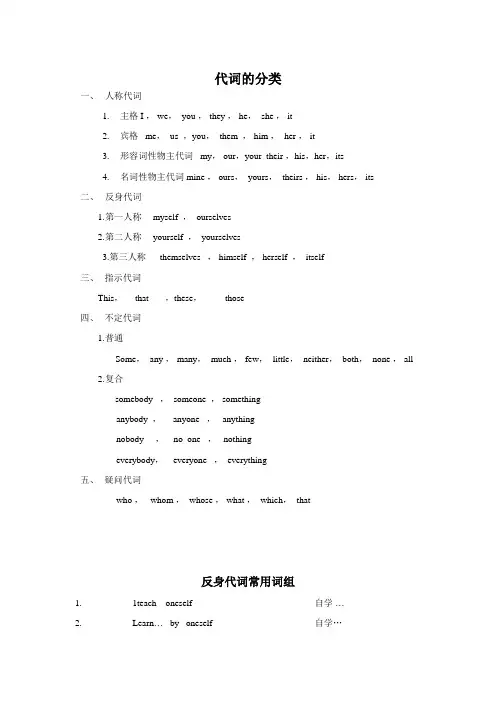
代词的分类一、人称代词1.主格I , we, you , they , he, she , it2.宾格 me, us ,you, them , him , her , it3.形容词性物主代词 my, our,your their ,his,her,its4.名词性物主代词 mine , ours, yours, theirs , his, hers, its二、反身代词1.第一人称 myself , ourselves2.第二人称 yourself , yourselves3.第三人称 themselves , himself , herself , itself三、指示代词This,that ,these,those四、不定代词1.普通Some, any , many, much , few, little, neither, both, none , all2.复合somebody , someone , somethinganybody , anyone , anythingnobody , no one , nothingeverybody, everyone , everything五、疑问代词who , whom , whose , what , which, that反身代词常用词组1.1teach oneself 自学…2.Learn… by oneself 自学…3.enjoy oneself 玩得开心4.help oneself 自便,随便……e to oneself 苏醒6.hurt oneself 受伤7.by oneself 独自8.make oneself at home 请不要客气例如1. Ben, can your son dress ( )No,he is only 3 years old . But he is learning to do it.A. HeB.his C, himself D, herself2. The final competition is coming near. Can I really do well?Believe in ( ).You are always the best in our school.A.youB.yourC.yoursD.yourself(一)单选1)What is ( ) name ?( ) is Mary.A.her, HerB.she, She C .her, She2)She is a student.( ) name is Julia.A.ItsB.HerC.HersD.His3)Is this your pencil case, Tim? No, it is not.( )is over there.A.MineB.MyC.MyselfD.I4)Could you please help ( ) with ( )English?A.I,myB.me,meC.me,myD.my,I5)Is this your father’s car? No,( ) car is black.A.MyB.HisC.HerD.Him(二)填空6) That is not ( ) kite. That kite is small , but ( ) is very big.(I)7) The dress is ( ) . Give it to ( ).(she)8) Is this ( ) watch?(you) No, it’s not ( ).(I)9)() is my brother. ( ) name is Jack. Look! Those stamps are()(he)10) ( ) dresses are red. (we) What color are ( )? (you)11) Here are many dolls, which one is ( )?(she)12) I have a beautiful cat. ( ) name is Mimi. These cakes are()。
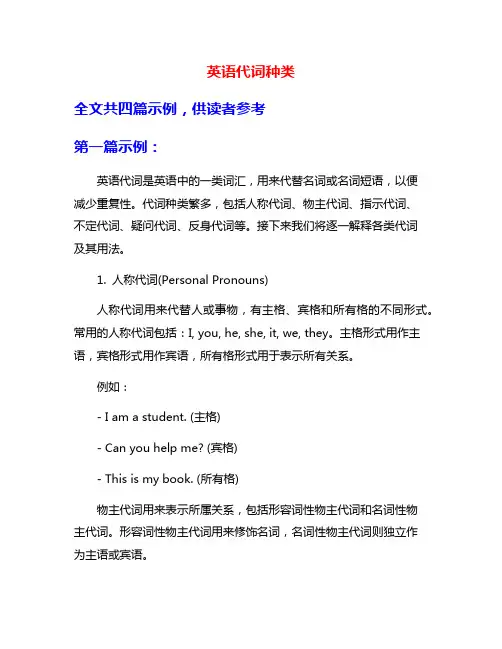
英语代词种类全文共四篇示例,供读者参考第一篇示例:英语代词是英语中的一类词汇,用来代替名词或名词短语,以便减少重复性。
代词种类繁多,包括人称代词、物主代词、指示代词、不定代词、疑问代词、反身代词等。
接下来我们将逐一解释各类代词及其用法。
1. 人称代词(Personal Pronouns)人称代词用来代替人或事物,有主格、宾格和所有格的不同形式。
常用的人称代词包括:I, you, he, she, it, we, they。
主格形式用作主语,宾格形式用作宾语,所有格形式用于表示所有关系。
例如:- I am a student. (主格)- Can you help me? (宾格)- This is my book. (所有格)物主代词用来表示所属关系,包括形容词性物主代词和名词性物主代词。
形容词性物主代词用来修饰名词,名词性物主代词则独立作为主语或宾语。
形容词性物主代词:my, your, his, her, its, our, their。
名词性物主代词:mine, yours, his, hers, its, ours, theirs。
指示代词用于表明特定的人或事物,包括this, that, these, those。
this和these用于接近的事物,that和those用于远处的事物。
不定代词用于指代不明确或泛指的人或事物,通常包括:all, some, any, none, either, both, neither, one, each等。
例如:- All of us are going to the party.- Some people like coffee, while others prefer tea.疑问代词用于提问,包括who, whom, whose, what, which。
who用于人,whom用于人作宾语,whose表示所有关系,what用于物,which用于选择。
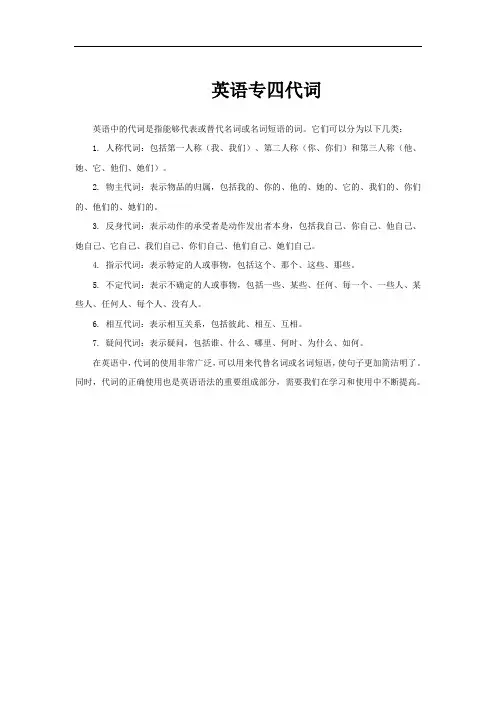
英语专四代词
英语中的代词是指能够代表或替代名词或名词短语的词。
它们可以分为以下几类:
1. 人称代词:包括第一人称(我、我们)、第二人称(你、你们)和第三人称(他、她、它、他们、她们)。
2. 物主代词:表示物品的归属,包括我的、你的、他的、她的、它的、我们的、你们的、他们的、她们的。
3. 反身代词:表示动作的承受者是动作发出者本身,包括我自己、你自己、他自己、她自己、它自己、我们自己、你们自己、他们自己、她们自己。
4. 指示代词:表示特定的人或事物,包括这个、那个、这些、那些。
5. 不定代词:表示不确定的人或事物,包括一些、某些、任何、每一个、一些人、某些人、任何人、每个人、没有人。
6. 相互代词:表示相互关系,包括彼此、相互、互相。
7. 疑问代词:表示疑问,包括谁、什么、哪里、何时、为什么、如何。
在英语中,代词的使用非常广泛,可以用来代替名词或名词短语,使句子更加简洁明了。
同时,代词的正确使用也是英语语法的重要组成部分,需要我们在学习和使用中不断提高。
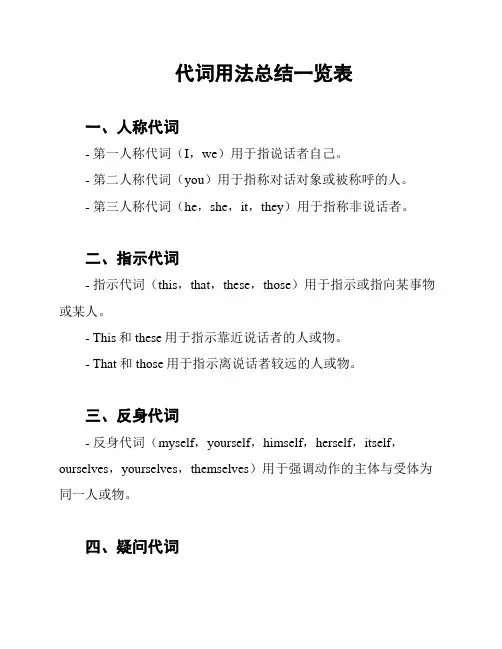
代词用法总结一览表一、人称代词- 第一人称代词(I,we)用于指说话者自己。
- 第二人称代词(you)用于指称对话对象或被称呼的人。
- 第三人称代词(he,she,it,they)用于指称非说话者。
二、指示代词- 指示代词(this,that,these,those)用于指示或指向某事物或某人。
- This和these用于指示靠近说话者的人或物。
- That和those用于指示离说话者较远的人或物。
三、反身代词- 反身代词(myself,yourself,himself,herself,itself,ourselves,yourselves,themselves)用于强调动作的主体与受体为同一人或物。
四、疑问代词- 疑问代词(who,what,which,whose,whom)用于提问某个人或事物的身份、性质、归属、数量等信息。
五、关系代词- 关系代词(who,whom,which,that,whose)用于引导定语从句,连接描述被修饰词的先行词和从句。
六、不定代词- 不定代词(some,any,no,every,each,both,either,neither,another,all,few,many,several,somebody,anybody,nobody,everyone,everything,anything,nothing)指示泛指或不特定的人或物。
七、物主代词- 物主代词(mine,yours,his,hers,its,ours,theirs)用于表示所有关系,代替名词性物主代词。
八、相互代词- 相互代词(each other,one another)用于表示两个或多个人或物之间的相互关系。
以上是代词用法的一览表,希望对您有所帮助。
(注:本文档为对代词用法的简单总结,并不详尽,仅供参考)。
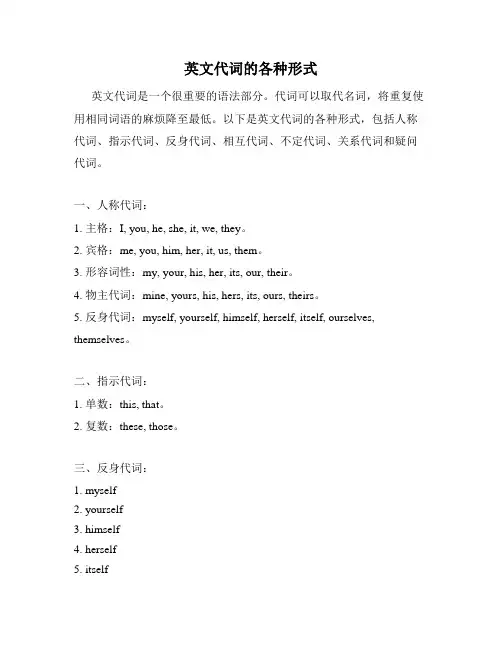
英文代词的各种形式英文代词是一个很重要的语法部分。
代词可以取代名词,将重复使用相同词语的麻烦降至最低。
以下是英文代词的各种形式,包括人称代词、指示代词、反身代词、相互代词、不定代词、关系代词和疑问代词。
一、人称代词:1. 主格:I, you, he, she, it, we, they。
2. 宾格:me, you, him, her, it, us, them。
3. 形容词性:my, your, his, her, its, our, their。
4. 物主代词:mine, yours, his, hers, its, ours, theirs。
5. 反身代词:myself, yourself, himself, herself, itself, ourselves, themselves。
二、指示代词:1. 单数:this, that。
2. 复数:these, those。
三、反身代词:1. myself2. yourself3. himself4. herself5. itself6. ourselves7. yourselves8. themselves四、相互代词:1. each other2. one another五、不定代词:1. some2. any3. no4. anybody/anyone5. somebody/someone6. nobody/no one7. everybody/everyone六、关系代词:1. that2. which3. who4. whom5. whose七、疑问代词:1. what2. who3. whom4. which5. whose以上是英文代词的各种形式。
对于想要成功学习英文的人来说,掌握这些代词是必不可少的。
对于英文写作、口语和听力理解来说,代词是非常重要的。
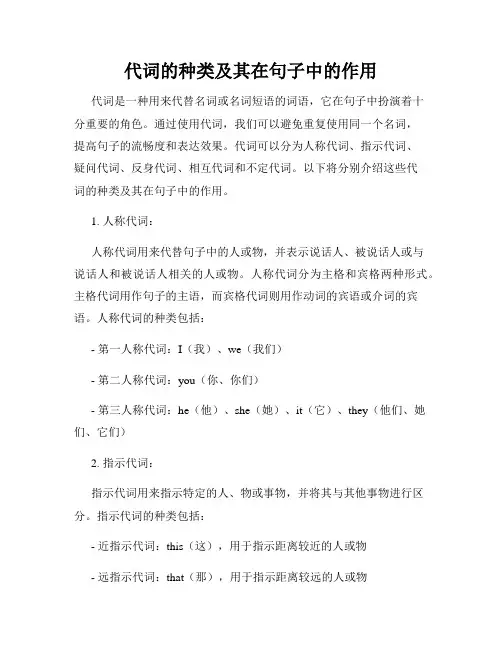
代词的种类及其在句子中的作用代词是一种用来代替名词或名词短语的词语,它在句子中扮演着十分重要的角色。
通过使用代词,我们可以避免重复使用同一个名词,提高句子的流畅度和表达效果。
代词可以分为人称代词、指示代词、疑问代词、反身代词、相互代词和不定代词。
以下将分别介绍这些代词的种类及其在句子中的作用。
1. 人称代词:人称代词用来代替句子中的人或物,并表示说话人、被说话人或与说话人和被说话人相关的人或物。
人称代词分为主格和宾格两种形式。
主格代词用作句子的主语,而宾格代词则用作动词的宾语或介词的宾语。
人称代词的种类包括:- 第一人称代词:I(我)、we(我们)- 第二人称代词:you(你、你们)- 第三人称代词:he(他)、she(她)、it(它)、they(他们、她们、它们)2. 指示代词:指示代词用来指示特定的人、物或事物,并将其与其他事物进行区分。
指示代词的种类包括:- 近指示代词:this(这),用于指示距离较近的人或物- 远指示代词:that(那),用于指示距离较远的人或物- 中性指示代词:these(这些)、those(那些),用于指示复数或泛指的人或物3. 疑问代词:疑问代词用来提问特定的人、物或事物,并引导提问句。
常见的疑问代词包括:- who(谁),用于询问人的身份或姓名- what(什么),用于询问事物的性质、名称等- which(哪一个),用于指定需要选择的事物或人- where(哪里),用于询问地点- when(什么时候),用于询问时间- why(为什么),用于询问原因4. 反身代词:反身代词用来表示动作的承受者和施事者是同一人或物。
反身代词的种类包括:- myself(我自己)- yourself(你自己、你们自己)- himself(他自己)- herself(她自己)- itself(它自己)- ourselves(我们自己)- yourselves(你们自己)- themselves(他们自己、她们自己、它们自己)5. 相互代词:相互代词表示相互之间的关系,用于表示两个或多个人或物之间的相互性动作或相互关系。
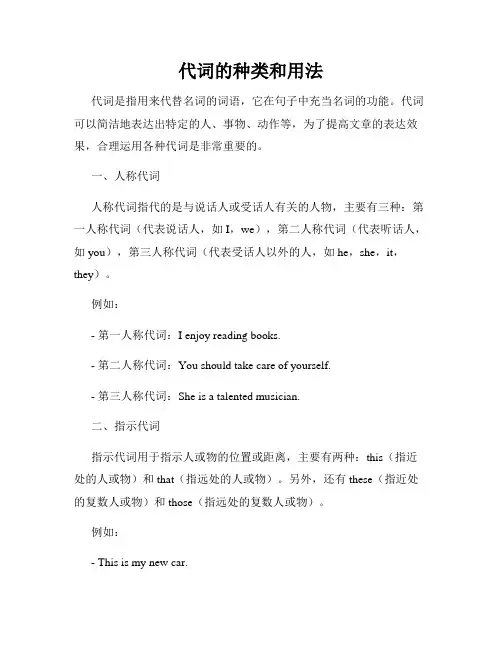
代词的种类和用法代词是指用来代替名词的词语,它在句子中充当名词的功能。
代词可以简洁地表达出特定的人、事物、动作等,为了提高文章的表达效果,合理运用各种代词是非常重要的。
一、人称代词人称代词指代的是与说话人或受话人有关的人物,主要有三种:第一人称代词(代表说话人,如I,we),第二人称代词(代表听话人,如you),第三人称代词(代表受话人以外的人,如he,she,it,they)。
例如:- 第一人称代词:I enjoy reading books.- 第二人称代词:You should take care of yourself.- 第三人称代词:She is a talented musician.二、指示代词指示代词用于指示人或物的位置或距离,主要有两种:this(指近处的人或物)和that(指远处的人或物)。
另外,还有these(指近处的复数人或物)和those(指远处的复数人或物)。
例如:- This is my new car.- That is a beautiful flower.- These are my friends.- Those houses are so big.三、疑问代词疑问代词用于提出问题,主要有三种:who(谁),what(什么),which(哪个)。
例如:- Who is that girl over there?- What do you want for dinner?- Which is your favorite color?四、反身代词反身代词用于强调某个动作的发出者与承受者是同一个人或同一组人,主要有:myself,yourself,himself,herself,itself,ourselves,yourselves,themselves。
例如:- She cooked the meal herself.- They built the house by themselves.五、不定代词不定代词指代的是不具体、不确定的人或物,主要有:some,any,no,each,either,neither,all,both,few,many,several,somebody,anybody,nobody,everybody,something,anything,nothing,everything等。
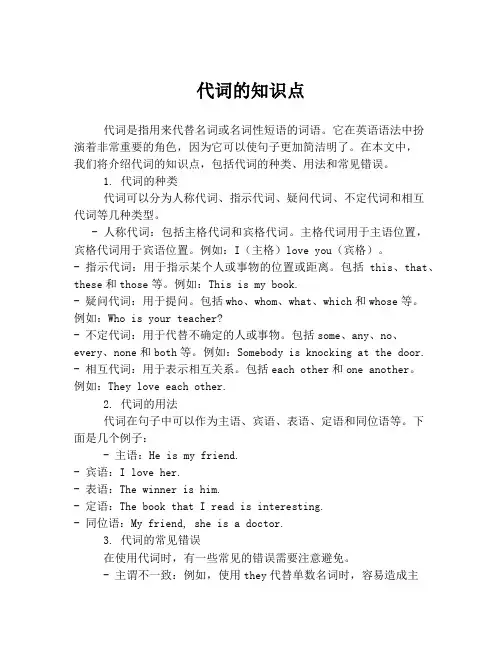
代词的知识点代词是指用来代替名词或名词性短语的词语。
它在英语语法中扮演着非常重要的角色,因为它可以使句子更加简洁明了。
在本文中,我们将介绍代词的知识点,包括代词的种类、用法和常见错误。
1. 代词的种类代词可以分为人称代词、指示代词、疑问代词、不定代词和相互代词等几种类型。
- 人称代词:包括主格代词和宾格代词。
主格代词用于主语位置,宾格代词用于宾语位置。
例如:I(主格)love you(宾格)。
- 指示代词:用于指示某个人或事物的位置或距离。
包括this、that、these和those等。
例如:This is my book.- 疑问代词:用于提问。
包括who、whom、what、which和whose等。
例如:Who is your teacher?- 不定代词:用于代替不确定的人或事物。
包括some、any、no、every、none和both等。
例如:Somebody is knocking at the door. - 相互代词:用于表示相互关系。
包括each other和one another。
例如:They love each other.2. 代词的用法代词在句子中可以作为主语、宾语、表语、定语和同位语等。
下面是几个例子:- 主语:He is my friend.- 宾语:I love her.- 表语:The winner is him.- 定语:The book that I read is interesting.- 同位语:My friend, she is a doctor.3. 代词的常见错误在使用代词时,有一些常见的错误需要注意避免。
- 主谓不一致:例如,使用they代替单数名词时,容易造成主谓不一致的错误。
正确的用法应该是使用he或she。
- 指代不清:在使用代词时,需要确保其指代的人或事物是清晰明了的。
例如,使用it代替多个事物时,容易造成指代不清的错误。
正确的用法应该是使用they或these等。
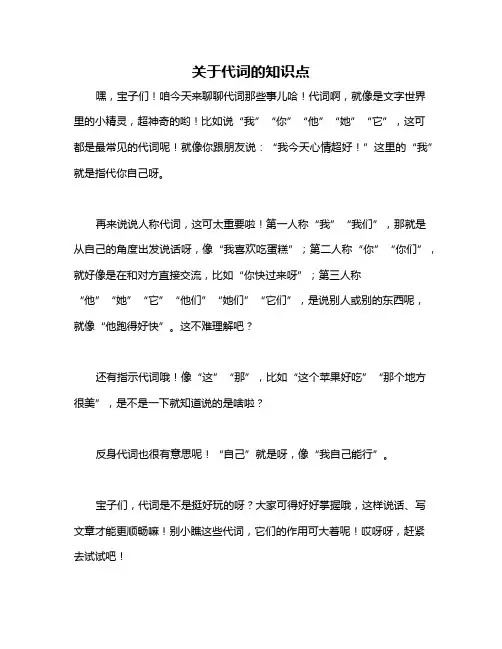
关于代词的知识点
嘿,宝子们!咱今天来聊聊代词那些事儿哈!代词啊,就像是文字世界里的小精灵,超神奇的哟!比如说“我”“你”“他”“她”“它”,这可都是最常见的代词呢!就像你跟朋友说:“我今天心情超好!”这里的“我”就是指代你自己呀。
再来说说人称代词,这可太重要啦!第一人称“我”“我们”,那就是从自己的角度出发说话呀,像“我喜欢吃蛋糕”;第二人称“你”“你们”,就好像是在和对方直接交流,比如“你快过来呀”;第三人称
“他”“她”“它”“他们”“她们”“它们”,是说别人或别的东西呢,就像“他跑得好快”。
这不难理解吧?
还有指示代词哦!像“这”“那”,比如“这个苹果好吃”“那个地方很美”,是不是一下就知道说的是啥啦?
反身代词也很有意思呢!“自己”就是呀,像“我自己能行”。
宝子们,代词是不是挺好玩的呀?大家可得好好掌握哦,这样说话、写文章才能更顺畅嘛!别小瞧这些代词,它们的作用可大着呢!哎呀呀,赶紧去试试吧!。
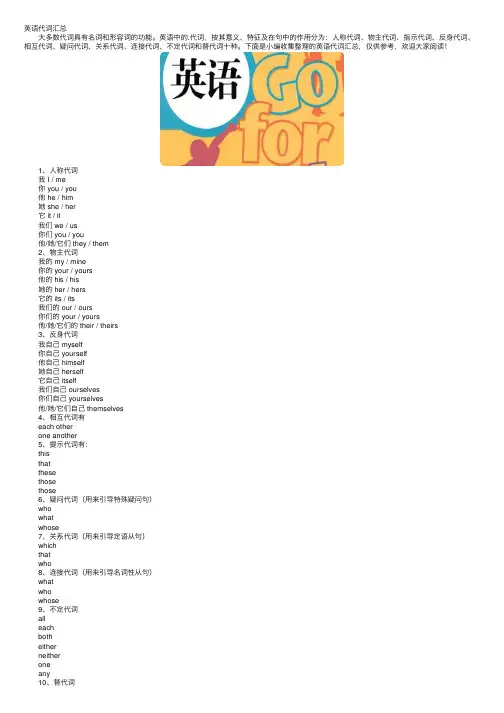
英语代词汇总 ⼤多数代词具有名词和形容词的功能。
英语中的.代词,按其意义、特征及在句中的作⽤分为:⼈称代词、物主代词、指⽰代词、反⾝代词、相互代词、疑问代词、关系代词、连接代词、不定代词和替代词⼗种。
下⾯是⼩编收集整理的英语代词汇总,仅供参考,欢迎⼤家阅读! 1、⼈称代词 我 I / me 你 you / you 他 he / him 她 she / her 它 it / it 我们 we / us 你们 you / you 他/她/它们 they / them 2、物主代词 我的 my / mine 你的 your / yours 他的 his / his 她的 her / hers 它的 its / its 我们的 our / ours 你们的 your / yours 他/她/它们的 their / theirs 3、反⾝代词 我⾃⼰ myself 你⾃⼰ yourself 他⾃⼰ himself 她⾃⼰ herself 它⾃⼰ itself 我们⾃⼰ ourselves 你们⾃⼰ yourselves 他/她/它们⾃⼰ themselves 4、相互代词有 each other one another 5、提⽰代词有: this that these those those 6、疑问代词(⽤来引导特殊疑问句) who what whose 7、关系代词(⽤来引导定语从句) which that who 8、连接代词(⽤来引导名词性从句) what who whose 9、不定代词 all each both either neither one any 10、替代词 指明代替任何特定名词或形容词的代词叫做不定代词。
【英语代词汇总】。
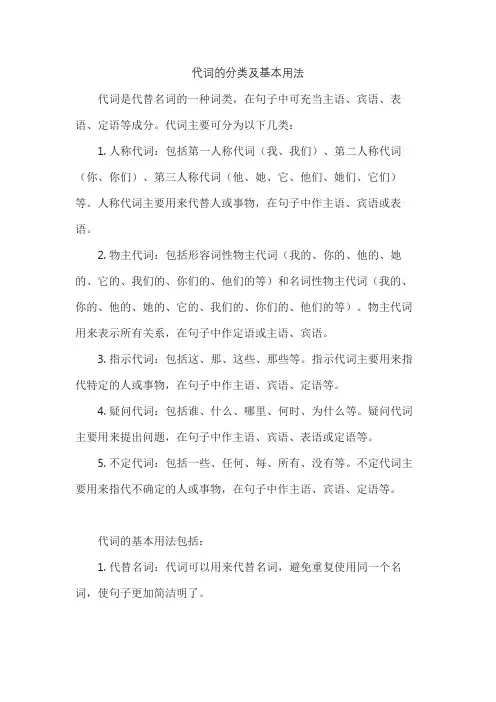
代词的分类及基本用法
代词是代替名词的一种词类,在句子中可充当主语、宾语、表语、定语等成分。
代词主要可分为以下几类:
1. 人称代词:包括第一人称代词(我、我们)、第二人称代词(你、你们)、第三人称代词(他、她、它、他们、她们、它们)等。
人称代词主要用来代替人或事物,在句子中作主语、宾语或表语。
2. 物主代词:包括形容词性物主代词(我的、你的、他的、她的、它的、我们的、你们的、他们的等)和名词性物主代词(我的、你的、他的、她的、它的、我们的、你们的、他们的等)。
物主代词用来表示所有关系,在句子中作定语或主语、宾语。
3. 指示代词:包括这、那、这些、那些等。
指示代词主要用来指代特定的人或事物,在句子中作主语、宾语、定语等。
4. 疑问代词:包括谁、什么、哪里、何时、为什么等。
疑问代词主要用来提出问题,在句子中作主语、宾语、表语或定语等。
5. 不定代词:包括一些、任何、每、所有、没有等。
不定代词主要用来指代不确定的人或事物,在句子中作主语、宾语、定语等。
代词的基本用法包括:
1. 代替名词:代词可以用来代替名词,避免重复使用同一个名词,使句子更加简洁明了。
2. 保持句子平衡:在句子中使用代词可以使句子结构更加平衡,避免头重脚轻的现象。
3. 明确指代对象:使用代词可以明确指代对象,避免歧义。
4. 加强语气:在某些情况下,使用代词可以加强语气,表达说话人的情感和态度。
代词的种类及5种代词的特别用法代词是用来替代名词或名词短语,以避免重复使用的词语。
根据代词的功能和用法,可以分为以下几类:人称代词、指示代词、反身代词、相互代词、物主代词、疑问代词、不定代词和关系代词。
以下是五种代词的特别用法:1.不定代词:不定代词用来指代不具体或不确定的人、物、数量或程度。
其中一些常见的不定代词包括:somebody(人),something(物),somewhere (地),anybody(任何人),anything(任何事物),anywhere(任何地方)。
不定代词通常用于肯定句、疑问句和否定句中。
例句:- I saw somebody at the supermarket.(我在超市看到一个人。
)- Is there anything I can help you with?(有什么我可以帮忙的吗?)2.物主代词:物主代词用来表示所属关系,代表人或物拥有的事物。
常见的物主代词有:mine(我的),yours(你的),his(他的),hers(她的),ours(我们的),theirs(他们的)。
物主代词通常由名词后加上's构成,也可以加上of来表示所属关系。
例句:- This book is mine.(这本书是我的。
)- The car is theirs.(这辆车是他们的。
)3.指示代词:指示代词用来指示一些人或物的位置或距离。
常见的指示代词有:this(这个),that(那个),these(这些),those(那些)。
指示代词通常用于强调、问句或陈述句中。
例句:- This is my house.(这是我的房子。
)- Are those your shoes?(那些是你的鞋子吗?)4.人称代词:人称代词用来指代人或事物的角色。
常见的人称代词有:I(我),you(你),he(他),she(她),it(它),we(我们),they(他们/她们)。
人称代词通常用于陈述句或问句中作为主语或宾语。
代词的种类和指代关系代词是指代名词或名词短语的词语,它可以在文中起到替代名词的作用。
在语言表达中,代词的种类和指代关系起着非常重要的作用。
以下将介绍代词的种类和指代关系,并讨论它们在语言交流中的应用。
一、人称代词人称代词是指代人或事物的代词,根据与说话者、听话者以及与说话者与听话者之间的关系,可分为第一人称、第二人称和第三人称代词。
1. 第一人称代词:我、我们第一人称代词指代说话人自己,用于表示说话人的身份和立场。
例如:“我喜欢唱歌。
”、“我们在一起度过了美好的时光。
”2. 第二人称代词:你、您第二人称代词代表与说话人进行交流的对象,用于表示对方的身份和立场。
例如:“你可以帮我吗?”、“您需要什么帮助?”3. 第三人称代词:他、她、它、他们、她们、它们第三人称代词用于指代与说话人和听话人以外的人或事物。
例如:“他正在读书。
”、“她们是我的好朋友。
”二、指示代词指示代词是用来指示、表示距离的代词,根据距离的近远,可分为近指代词和远指代词。
1. 近指代词:这、这个、这些近指代词用于指示离说话人较近的人或事物。
例如:“这本书很有趣。
”、“这些苹果是新鲜的。
”2. 远指代词:那、那个、那些远指代词用于指示离说话人较远的人或事物。
例如:“那辆车很漂亮。
”、“那些问题需要解决。
”三、疑问代词疑问代词是用来提问的代词,用于询问事物的性质、成分、数量等。
1. 谁:用于询问人的身份或身份特征。
例如:“谁来了?”、“你是谁?”2. 什么:用于询问事物的特征、性质或其他信息。
例如:“你在读什么书?”、“这是什么东西?”四、不定代词不定代词是指代泛指的代词,表示不确定或不具体的人、事、物以及数量。
1. 例示不定代词:一些、几个、许多例示不定代词用于泛指一些人或物的数量。
例如:“有一些学生在教室里。
”、“他买了几个苹果。
”2. 独立不定代词:所有、大多数、任何独立不定代词用于泛指整体或全部的人或物。
例如:“所有人都喜欢这个节目。
代词英语词汇表代词英语词汇表代词是英语中一类非常重要的词汇,它们用来替代名词,并且在句子中具有特定的功能和作用。
在本篇文章中,我们将介绍一些常见的代词,并提供它们的中文意思和用法示例。
希望这个英语词汇表可以帮助你更好地理解和运用代词。
一、人称代词(Personal Pronouns)人称代词用于指代人或物体,并表示说话者、听话者或与被谈论的人或物体之间的关系。
以下是一些常见人称代词及其用法:1. 主格代词(Subject Pronouns)- I(我):I am a student.(我是一个学生。
)- You(你,你们):You are my friend.(你是我的朋友。
)- He(他):He is a doctor.(他是一名医生。
)- She(她):She is a teacher.(她是一名教师。
)- It(它):It is a cat.(它是一只猫。
)- We(我们):We are a team.(我们是一个团队。
)- They(他们,她们,它们):They are good students.(他们是好学生。
)2. 宾格代词(Object Pronouns)- Me(我):He greeted me.(他向我打招呼。
)- You(你,你们):I saw you yesterday.(我昨天见到了你。
)- Him(他):I helped him with his homework.(我帮他做作业。
)- Her(她):I gave the book to her.(我把书给了她。
)- It(它):The cat followed me, it was adorable.(那只猫跟着我,它很可爱。
)- Us(我们):They invited us to their party.(他们邀请我们参加他们的派对。
)- Them(他们,她们,它们):I called them yesterday.(我昨天给他们打电话了。
常用代词大全
一、人称代词
1.第一人称代词:我、我们
2.第二人称代词:你、你们
3.第三人称代词:他、她、它、他们、她们、它们
二、物主代词
1.第一人称物主代词:我的、我们的
2.第二人称物主代词:你的、你们的
3.第三人称物主代词:他的、她的、它的、他们的、她们的、它们的
三、指示代词
1.远指示代词:那、那个、那些
2.近指示代词:这、这个、这些
四、疑问代词
1.怎样的:什么样的、哪种、哪样
2.什么:什么、什么事、什么东西、什么地方
3.谁的:谁、谁的、哪个人
五、不定代词
1.一些:一些、一些人、一些东西、一些地方
2.任何的:任何的、任何人、任何东西、任何地方
3.所有的:所有的、所有人、所有东西、所有地方
六、反身代词
1.自己:自己、自己的、自己人
2.互相:彼此、相互、互相帮助
七、相互代词
1.所有:所有、所有人、所有事、所有东西、所有地方
八、关系代词
1.介词性关系代词:关系代词 + 介词
2.代词性关系代词:关系代词作主语或宾语
九、不定形容词性代词
1.某个:某个、某人、某事、某地
2.不同的:不同的、不同人、不同事、不同东西、不同地方
3.许多:许多、许多人、许多事、许多东西、许多地方
十、相对代词
1.哪一个:哪一个、哪一个人、哪一个事、哪一个东西、哪一个地方
2.任何一个:任何一个、任何一个人、任何一个事、任何一个东西、任何一个地方
以上是常用的代词大全,希望对您有所帮助。
代词的用法和分类代词是语法中的一类词语,它可以替代名词或名词短语的作用,用来引用或指示人、事物、地点等。
代词的使用可以减少重复,简化句子结构,也能提高语言表达的流畅度。
在英语中,代词的用法非常广泛,下面将介绍代词的分类以及不同类型代词的用法。
一、人称代词人称代词主要用来指代人或人群,在语法上根据人称的不同可分为第一人称、第二人称和第三人称代词。
1. 第一人称代词:主要用来指代说话人自己,表达个人的意见、感受等。
常见的第一人称代词有:I,me,my,mine,we,us,our,ours等。
例如:- I like to read books in my free time.(我喜欢在空闲时间阅读书籍。
)- We went to the park yesterday.(我们昨天去了公园。
)2. 第二人称代词:用来指代对话的对象或称呼某个人,常见的第二人称代词有:you,your,yours等。
例如:- Can you pass me your pen?(你能把你的笔递给我吗?)- You should do your homework before playing games.(你在玩游戏之前应该先做作业。
)3. 第三人称代词:用来指代除说话人和对话对象以外的其他人或事物。
常见的第三人称代词有:he,she,it,him,her,his,hers,its,they,them,their,theirs等。
例如:- He is a doctor.(他是一名医生。
)- The dog wagged its tail happily.(那只狗高兴地摇了摇尾巴。
)二、指示代词指示代词主要用来引用或指示特定的人、物、地点等,常见的指示代词有 this,that,these,those。
例如:- This is my new car.(这是我的新车。
)- I like those flowers in the garden.(我喜欢花园里的那些花。
1.all pron.全体;全部2.another pron.另一个(的);又一个(的)3.anybody pron.任何人4.anyone pron. 任何人5.anything pron.任何事(物)6.both adj.&pron.两个(人...)都7.each pron.各自;各个8.everybody pron.每人;人人9.everyone pron.=everybody 每人,人人10.everything pron.每件事;每样东西;一切11.he pron.他12.her pron.她的13.hers pron.她的14.herself pron.她自己15.him pron.他(宾格)16.himself pron.他自己17.his pron.他的18.I pron.我19.it pron.它20.its pron.它的21.me pron.我[I的宾格]22.mine pron.我的23.my pron.我的24.myself pron.我自己25.neither adj.&pron.(两者)都不26.nobody pron.没有人27.none pron.一个人也没有;没有任何东西28.nothing pron.没有什么;没有东西29.one pron.(用来代替单数的人或物)30.our pron.我们的31.ours pron.我们的32.ourselves pron.我们自己33.several adj./pron.几个;若干34.she pron.她35.some adj.&pron.一些;若干36.somebody =someone pron.某人;有人37.something pron.某事(物);某东西38.that pron.&a.那,那个39.their pron.他(她;它)们的40.theirs pron.他(她;它)们的41.them pron.他们,它们,她们42.themselves pron.他(她,它)们自己43.these pron.这些44.they pron.他们(她们,它们)45.this pron.&a.这,这个46.those pron.那些 pron.我们48.we pron.我们49.what pron.&a.什么50.which a.&pron.哪一个;哪些51.who pron.谁52.whom pron.谁;哪个人(who的宾格)53.whose pron.谁的54.you pron.你;你们55.your pron.你的;你们的56.yours pron.你的;你们的57.yourself pron.你自己58.yourselves pron.你们自己。
1. 代词的分类英语中的代词分为:人称代词、物主代词、自身代词、相互代词、指示代词、疑问代词、关系代词和不定代词。
2. 人称代词表示人称范畴的代词称为人称代词。
人称代词有:I, we, you, they, he, she, it, me, us, them, him, her。
1) 人称代词主格与宾格的选择(1) 一般说来,人称代词作主语用主格,作宾语或介词宾语用宾格。
I don‟ want to put you to any trouble.No one put us to any trouble.We‟re only too glad to be able to help a soul in need.但在很多情况下因文体等原因常有不按上面规则使用的情况。
(2) 在简短对话中,当人称代词单独使用或在not 后,多用宾格。
例如:…Who is that?‟ … (It‟s) me.‟ …Who said that?” …Not me.‟注:如果不用省略形式,be后也可用主格,但为正式用法,如It is I./It was she.(3) 在口语中,宾格形式有时用在带and的并列主语里。
Tom and me are going to buy a new house.(4) 非正式文体中, I常用在并列宾语里。
This is the problem between you and I.(5) as , than.之后既可以使用宾格形式也可以使用主格形式,主格形式更为正式。
You can do better than he/him.He is not as intelligent as I/me.若人称代词后面要跟动词,人称代词则只能用主格形式。
He is taller than I am. (He is taller than I/me.)You can do better than she can.(6) 在电话用语中常用主格。
— I wish to speak to Jack. 我想和杰克通话。
— This is he.我就是。
(7) 人称代词在分裂句中作中心成分时,常用主格,但在非正式语体中可以用宾格。
It was she/her who finally succeeded.It was he/him who was responsible for the accident.当人称代词在随后的从句中处于宾语地位时,则多用宾格。
It was her that I am taking care of.It was him that I wanted to talk to.(8) 当句子的主语是“everybody/ nobody + but/except +人称代词”的结构时,人称代词常用主格。
因为but等虽是介词但人称代词处于主语的地位。
Nobody but she can solve this problem.Everybody except he argued against our proposal.但若介词词组“but/ except +人称代词”出现在句尾时,则人称代词用宾格。
Nobody can solve this problem but her.Everybody argued against our proposal except him.如果“everybody/ nobody + but/except +人称代词”的结构作句子的宾语,则人称代词只能用宾语。
例如:He has told everybody except her.2) 关于人称代词的指代用法有以下几点值得注意:(1) 人称代词通常指特定的人或物。
但是某些人称代词也可泛指一般的人或物。
we, you, he 可以用来泛指一般人;they 可以用来泛指某些人。
例如:We (you) should be more patient under such circumstances.在这样的情况下,大家应该耐心。
He who hesitates is lost.优柔寡断的人必会失去良机。
They can‟t make decent pictures.现今拍不出像样的片子。
(2) 婴儿或未知性别的人可以用it来指代。
Who is it ? 是谁?Look at that baby. It is so cute.(3) 感叹句中用it指代人,表示亲密或鄙视等感情色彩。
What a smart girl it is! 表示亲密What a cruel man it is! 表示鄙视(4) 动物名词的指代一般用it或they代替,有时也用he, she,但总是带有某种感情色彩。
Give the cat some food. He must be hungry.(5) 指代车、船舶、月亮、国家等词语时,可用she等,但含有感情色彩。
How is your car? Dose she work well?You can name the boat, and she will be yours.China is one of the biggest countries in the world. She is steadily growing.Look at the moon. She is so beautiful!3) 并列人称代词的排列顺序(1) 第一人称加第二、三人称时:you and he,you and I,he and I,You, he and I(2) 第一人称+带后置定语的并列成分时:I and the girl sitting next to me were asked to clean the classroom.(3) 在承认错误,承担责任或第一人称是长辈、上级时:It was I and Mary messed it up. 是我和玛丽把事情弄糟了。
My child, I and you will do it together(4) 复数人称代词作主语时:we, you and they3.物主代词1) 一般用法传统上将物主代词分为形容词性(my, your, his, her, its our, their)和名词性(mine, yours, his, hers, its, ours, theirs)的。
现在很多语法书把形容词性的物主代词归入限定词:May I use your car? Mine was broken.名词性的物主代词在用法上相当于省略了中心词的属格结构,能起名词的作用:I will wash your coat first and mine later.(作宾语)It‟s your coat. That red one is mine.(作表语)名词性物主代词还可以与of连用构成双重属格:a friend of mine/the business of yours2)其他用法(1) His, Your, Her可以和Majesty, Honour ,等连用,表示尊称。
直接称呼时用Your, 间接提及用His或Her:Your Majesty. 陛下/His Highness(= The Prince)/Her Majesty= (The Queen)(2) my 用于感叹句时,表示惊奇,高兴,痛苦等含义:My! You made it!。
(3) Yours 常用在书信的末尾:Yours sincerely(英)或sincerely yours。
3)在“及物动词+宾语+身体部位/系动词+表语+身体部位/系动词+过去分词+身体部位”这样的结构中,the可以替代物主代词:He touched him on the head./The little boy became red in the face./He was wounded in the arm.4. 自身代词1) 以-self 或-selves结尾的代词称为自身代词。
自身代词主要有两种作用,一是表示主语发出的动作及于自身,二是起强调的作用:Take good care of yourself.He himself is a teacher.I am not myself today.我今天身体不适。
2) 自身代词不能单独作主语,但在and, or, nor连接的并列主语中,第二个主语可用自身代词,特别是myself:My father and myself saw it.3) 有些动词在表达某个特定意义时必须带自身代词,如:absent, bathe, amuse, blame, dry, cut, enjoy, hurt, introduce, behave等:We enjoyed ourselves very much tonight.You …d better behave yourself.4)在不强调的情况下,but, except, for等介词后宾语用自身代词或人称代词宾格均可:No one but myself (me) knows how to do it.5)自身代词有成语性用法:to oneself(为自己所用),for oneself(替自己,为自己),of oneself(自动地,自愿的):I wished to have a room to myself.You have to decide for yourself.It will change of itself.5. 相互代词each other和one another两个词组表示相互关系,称为相互代词,常用做宾语,通常不用作主语。
People should love each other and help each other. 人们应当彼此相爱,彼此帮助。
这两个词都有所有格形式:They are looking into one another‟s eyes.6. 指示代词1)指示代词指有指示意义的this,that,these,those等。
指示代词既可起限定的作用(现归入限定词),也可起代词的作用:This girl is Jean(限定作用),This is Jean. (代词作用)。
2) 使用指示代词时需注意的问题:(1)指示代词作主语时既可指物也可指人,作其他句子成分时一般指物:That is my brother. That is my book.I love this. (* He is going to marry this,因为this作宾语时一般不能指人。
)(2)this 和that 可以表示程度(这时它是副词):I can‟t tell that much.She is not that foolish,(3)that 和those 常指前面提到的东西,而this 和these 指下面谈到的事物:You are too radical. That‟s where you are wrong.Those are the problems we are going to talk about.I want to tell you this: You are an angel.that 和those 有时用来表示前面提到的东西以避免重复这个名词。